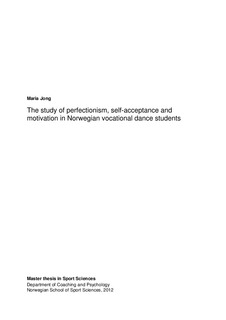| dc.description.abstract | Being a professional dancer, like an elite athlete, is characterized by extreme physicaland
psychological demands, strict discipline, high commitment and with a pressure and
pursuit to perform flawlessly. Due to the extreme achievement striving, physical- and
psychological consequences associated with burnout may occur (Quested & Duda,
2011a) Previous research (e.g., Hill, Hall, Appleton and Kozub, 2008) has indicated that
perfectionism may be an important personality factor when examine vulnerability to and
development of burnout in elite athletes. Few studies to date have investigated
perfectionism and burnout in vocational dancers, but there is a great transfer value from
research done in sporting contexts to dance, which can be viewed as an esthetic sport.
The first purpose of the present study was to investigate the prevalence of and influence
of Self-Oriented(SOP)- and Socially-Prescribed(SPP) perfectionism, Unconditional
Self-Acceptance and Self-determined motivation (SDT: Ryan & Deci, 2000) on the
development of burnout in vocational dancers in Norway. A second purpose was to
investigate whether the association between perfectionism and burnout was mediated by
unconditional self-acceptance. One hundred and forty vocational dancers (M age=22,
SD= 2.0) completed questionnaires measuring the variables of interest at one point of
time. The results using bivariate correlations analyses indicated significant positive
relations between both SOP and SPP and burnout, and significant negative relations
between unconditional self-acceptance and self-determination and burnout. The results
showed that intrinsic motivation had the strongest negative relation to burnout
symptoms. By using hierarchical regression analyses the results indicated that
unconditional self-acceptance served as a partial mediator in the relationship between
SPP and burnout, and fully mediated the relation between SOP and burnout. Findings
point out the relevance and importance of strengthen an unconditional self-acceptance
in dancers, and promote a dance environment with emphasis on self-determined
motivation, by satisfaction of basic psychological needs to avoid burnout in vocational
dancers (Quested & Duda 2011a). | no_NO |
